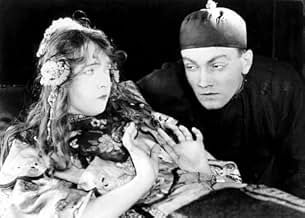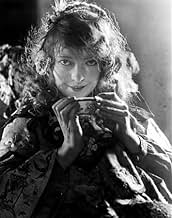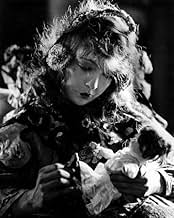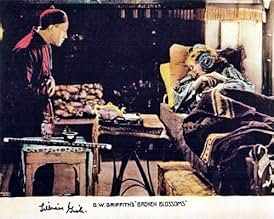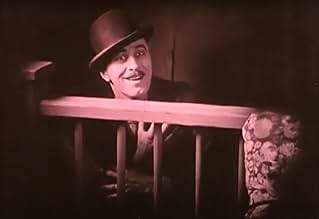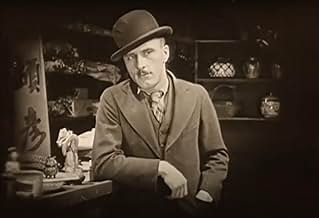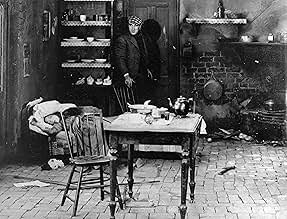Eine Blüte gebrochen
Originaltitel: Broken Blossoms or The Yellow Man and the Girl
IMDb-BEWERTUNG
7,2/10
11.573
IHRE BEWERTUNG
Der Chinese Cheng Huan verlässt seine Heimat, um die Lehren Buddhas in der Welt zu verbreiten. Sein Optimismus verschwindet, nachdem er in London die brutale Realität kennerlernt.Der Chinese Cheng Huan verlässt seine Heimat, um die Lehren Buddhas in der Welt zu verbreiten. Sein Optimismus verschwindet, nachdem er in London die brutale Realität kennerlernt.Der Chinese Cheng Huan verlässt seine Heimat, um die Lehren Buddhas in der Welt zu verbreiten. Sein Optimismus verschwindet, nachdem er in London die brutale Realität kennerlernt.
- Regie
- Drehbuch
- Hauptbesetzung
- Auszeichnungen
- 1 wins total
Lillian Gish
- Lucy - The Girl
- (as Miss Lillian Gish)
Richard Barthelmess
- Cheng Huan - The Yellow Man
- (as Mr. Richard Barthelmess)
Edward Peil Sr.
- Evil Eye
- (as Edward Peil)
Ernest Butterworth
- Secondary Role
- (Nicht genannt)
Frederic Hamen
- Secondary Role
- (Nicht genannt)
Wilbur Higby
- London Policeman
- (Nicht genannt)
Man-Ching Kwan
- Buddhist Monk
- (Nicht genannt)
Bobbie Mack
- Ringside Employee
- (Nicht genannt)
Moy Ming
- Minor Role
- (Nicht genannt)
Steve Murphy
- Fight Spectator
- (Nicht genannt)
George Nichols
- Police Constable
- (Nicht genannt)
Karla Schramm
- Burrows' Girlfriend
- (Nicht genannt)
Bessie Wong
- Girl in China
- (Nicht genannt)
Empfohlene Bewertungen
10drpax
"In this scarlet house of sin, does he ever hear the temple bells?" Broken Blossoms is the movie I use to introduce people to silent film who only know it from Chaplin shorts or Birth of a Nation. It is one of the most sensitive movies ever made, in my opinion, and is usually overlooked in any top 100 movie listing. I fear the oversight is due to the listers not having actually seen it.
The version I have--which is now sadly out of print--is the Thames Video version with Lillian Gish's introduction. It is also the one with the original Louis Gotshalk score, pieces of which are sometimes heard on other versions, but the impact of the full orchestral Gotshalk score is overwhelming on an already exquisite film. If you have a chance to see this version, by all means do so.
In answer to a question in another posting, the movie WAS originally tinted--it was part of the "epic poetry" attempt and was quite common with a lot of Griffith work--even back to "A Corner in Wheat".
While I am an immense Gish fan, a lot has already been said about Miss Lillian in the other comments, so I will concentrate on Dick Bartlemess as Chen Huan. The quote above accompanied by his sad look as he leans against the wall of his curio shop tell it all: wrecked youthful enthusiasm--his despair only temporarily abated by the "pipe" in the Limehouse opium dens. His dreams of youth, all packed away in his garret, are only brought out when the one thing that gives him hope that is goodness amidst all the squalor stumbles into his shop.
Only after Lucy arrives can Chen Huan allow himself to dream--to return to golden days of learning, beauty and goodness and ideals. He literally places his dreams of his lost youth on the trembling body of Lucy, but it such a pristine ideal he dare not "defame" it, or it too will disappear like all his other dreams. He must observe it from afar--almost ephemeral. He knows what Hell is like (even before he was shown the booklet by the Christian Brothers). His hell is his lost heart, his lost love. "Bits and pieces of his shattered life." Almost invariably when I find someone to share the movie with me, they are amazed how well it is made and how well it's core story stands up to today. The particulars of Chinese, Cockney and London are not the point; it is a story of hope and despair, of lovers and dreamers. A mature story for a mature audience.
I often wonder if it could be made today. As open as we think we are, I wonder if the basic story could be told again. No matter--it's been told--excellently
The version I have--which is now sadly out of print--is the Thames Video version with Lillian Gish's introduction. It is also the one with the original Louis Gotshalk score, pieces of which are sometimes heard on other versions, but the impact of the full orchestral Gotshalk score is overwhelming on an already exquisite film. If you have a chance to see this version, by all means do so.
In answer to a question in another posting, the movie WAS originally tinted--it was part of the "epic poetry" attempt and was quite common with a lot of Griffith work--even back to "A Corner in Wheat".
While I am an immense Gish fan, a lot has already been said about Miss Lillian in the other comments, so I will concentrate on Dick Bartlemess as Chen Huan. The quote above accompanied by his sad look as he leans against the wall of his curio shop tell it all: wrecked youthful enthusiasm--his despair only temporarily abated by the "pipe" in the Limehouse opium dens. His dreams of youth, all packed away in his garret, are only brought out when the one thing that gives him hope that is goodness amidst all the squalor stumbles into his shop.
Only after Lucy arrives can Chen Huan allow himself to dream--to return to golden days of learning, beauty and goodness and ideals. He literally places his dreams of his lost youth on the trembling body of Lucy, but it such a pristine ideal he dare not "defame" it, or it too will disappear like all his other dreams. He must observe it from afar--almost ephemeral. He knows what Hell is like (even before he was shown the booklet by the Christian Brothers). His hell is his lost heart, his lost love. "Bits and pieces of his shattered life." Almost invariably when I find someone to share the movie with me, they are amazed how well it is made and how well it's core story stands up to today. The particulars of Chinese, Cockney and London are not the point; it is a story of hope and despair, of lovers and dreamers. A mature story for a mature audience.
I often wonder if it could be made today. As open as we think we are, I wonder if the basic story could be told again. No matter--it's been told--excellently
With some excellent acting performances and an interesting, memorable story, "Broken Blossoms" is one of the better pictures of the late 1910s, and it has held up rather well despite a couple of obvious signs of age. It would be hard to top Lillian Gish's performance as Lucy in any era, and Richard Barthelmess turns in a purposefully restrained and surprisingly effective performance in a role that was far from easy.
The story ties together several weighty themes, and most of them are still pertinent. This is the kind of movie that is sometimes considered to be dated, yet in terms of the main conflicts and struggles that the characters face, there are probably fewer differences between 1919 and 2004 than many might wish there to be. With material like this, it is also easy to allow it to become labored or heavy-handed. As it is, the tone is somber and austere throughout, yet most of the time this is in a thoughtful way.
Since Griffith's work is still so well-known and meets with such widely varying responses, it can sometimes be hard to evaluate his movies individually, without reference to the rest of his filmography. The story here is unusual enough in itself, with the different races and religions of the characters and the implied images represented by each of them. Each character is rather quickly defined as good or bad - a common state of affairs in Griffith movies - and as a result the story is told in a way that reflects that presumption, for better or for worse.
What is hard to deny is that the story and characters will stick with you afterwards. The impression that it leaves is not an entirely happy one, but the movie successfully evokes the humanity of all involved, which is a not unworthy goal and a not insignificant achievement.
The story ties together several weighty themes, and most of them are still pertinent. This is the kind of movie that is sometimes considered to be dated, yet in terms of the main conflicts and struggles that the characters face, there are probably fewer differences between 1919 and 2004 than many might wish there to be. With material like this, it is also easy to allow it to become labored or heavy-handed. As it is, the tone is somber and austere throughout, yet most of the time this is in a thoughtful way.
Since Griffith's work is still so well-known and meets with such widely varying responses, it can sometimes be hard to evaluate his movies individually, without reference to the rest of his filmography. The story here is unusual enough in itself, with the different races and religions of the characters and the implied images represented by each of them. Each character is rather quickly defined as good or bad - a common state of affairs in Griffith movies - and as a result the story is told in a way that reflects that presumption, for better or for worse.
What is hard to deny is that the story and characters will stick with you afterwards. The impression that it leaves is not an entirely happy one, but the movie successfully evokes the humanity of all involved, which is a not unworthy goal and a not insignificant achievement.
D.W.Griffith returns for another one and it would appear that he was still fighting with the demons left over from A Birth of a Nation (1915). He again tried to deal with the fires of racism, but this time with a love story and another appearance by Lillian Gish, in Broken Blossoms (1919). This film's title is actually "Broken Blossoms or the Yellow Man and the Girl". "Yellow Man" refers to the Asian man, Cheng Huan, who falls in love with Gish's Lucy. Right off the bat we get exposed to old time racist terms. The "C" word makes an appearance too. But, Griffith does use this film as a tool to teach a lesson to those who are evil or just plain bad.
It covers a lot of domestic/controversial issues, such as, interracial relationships, child abuse, racism and bullying. It is a hope that this film was the first stepping stone to finding tolerance in the world. It also is a telling lesson about, no matter how civilized you are, you can still do a lot of wrong. Huan (Barthelmess), leaves his homeland to go to England to spread the wisdom of the Buddha to the West and the Anglo-Saxons. It is the biggest mistake he would make in his life. It is a telling story about how the good guy finishes last. The man who comes to the civilized world to try and help make those people better, finds out that he is in the wrong place at the wrong time and nothing but torment befalls him.
Huan assigns himself the job to look after a young woman (Gish), who is terrorized and beaten by her boxer father (Crisp), on a daily basis. Huan has to deal with snitches and liars who align themselves with the evil boxer and in the end finds himself falling into the same dark abyss that he tried to teach others to stay away from. This is an amazing story and has been told many times since, but being that this is a pioneering effort, makes it all the more powerful. True, there are parts that are slow and even boring, but it is that tense situation that starts to build and build until the terrifying and sad end.
8.1 (B MyGrade) = 8 IMDB
It covers a lot of domestic/controversial issues, such as, interracial relationships, child abuse, racism and bullying. It is a hope that this film was the first stepping stone to finding tolerance in the world. It also is a telling lesson about, no matter how civilized you are, you can still do a lot of wrong. Huan (Barthelmess), leaves his homeland to go to England to spread the wisdom of the Buddha to the West and the Anglo-Saxons. It is the biggest mistake he would make in his life. It is a telling story about how the good guy finishes last. The man who comes to the civilized world to try and help make those people better, finds out that he is in the wrong place at the wrong time and nothing but torment befalls him.
Huan assigns himself the job to look after a young woman (Gish), who is terrorized and beaten by her boxer father (Crisp), on a daily basis. Huan has to deal with snitches and liars who align themselves with the evil boxer and in the end finds himself falling into the same dark abyss that he tried to teach others to stay away from. This is an amazing story and has been told many times since, but being that this is a pioneering effort, makes it all the more powerful. True, there are parts that are slow and even boring, but it is that tense situation that starts to build and build until the terrifying and sad end.
8.1 (B MyGrade) = 8 IMDB
Many people believe the best Griffith film is "Intolerance"; some stand by "Way Down East" and still others believe in "Birth of a Nation" despite all its problems. However, I think "Broken Blossoms" is the Griffith film which stands the test of time and still rings true today, over 83 years from its debut.
"Broken Blossoms" is the story of two wounded, abused, seemingly hopeless individuals who find comfort and strength in one another. The Chinaman (played by Richard Barthelmess) and little Lucy Burrows (played by Lillian Gish) are as different as night is to day, however they complement each other and give each other what the other needs; Lucy gives the Chinaman respect as a human being, he in turn gives Lucy affection and love.
What happens to the two souls is, in my opinion, one of the most heartbreaking turn of events ever filmed. The brutal treatment of Lucy by her father and the ultimate sadness of the Chinaman at the end of the film always reduce me to tears.
Those who believe that silent movies are inferior to today's craft really needs to see "Broken Blossoms" and open their hearts and minds to a world that is beyond beauty and beyond pain.
"Broken Blossoms" is the story of two wounded, abused, seemingly hopeless individuals who find comfort and strength in one another. The Chinaman (played by Richard Barthelmess) and little Lucy Burrows (played by Lillian Gish) are as different as night is to day, however they complement each other and give each other what the other needs; Lucy gives the Chinaman respect as a human being, he in turn gives Lucy affection and love.
What happens to the two souls is, in my opinion, one of the most heartbreaking turn of events ever filmed. The brutal treatment of Lucy by her father and the ultimate sadness of the Chinaman at the end of the film always reduce me to tears.
Those who believe that silent movies are inferior to today's craft really needs to see "Broken Blossoms" and open their hearts and minds to a world that is beyond beauty and beyond pain.
The subjects this film deals with are ugly, but the whole thing is done in a beautiful way.
Subjects dealt with are racism, poverty and the reasons why.
The way Griffith deals with these subjects is the contrasts settings. Look at the room above the Chinaman's shop: opulent, festooned with the finest oriental silk. Compare that with the stark squalor of the abode of Lucy and her bruiser of a father. Then there is the education and sophistication of the orientals compared to the simplistic, ill-thought-out racial prejudice of Battling and his cronies.
I also enjoyed the boxing match. Very realistic - not the fantastic nonsense of your Rocky-type bout where a man all but beaten to a jelly suddenly pulls some heavy punches from nowhere and wins the fight.
The acting, as has been mentioned elsewhere, is terrific from all three of the principal characters. Also, their characters are well-drawn. Even Battling Burrows - complete with cauliflower ear - is more than a mere heavy: he boxes for a living, he drinks, he lives in a slum with few worldly possessions. Why?
I find it hard to believe that the films they make nowadays are nowhere near as good as this. Whatever happened to progress?
This film spawned the famous song "Limehouse Blues."
Subjects dealt with are racism, poverty and the reasons why.
The way Griffith deals with these subjects is the contrasts settings. Look at the room above the Chinaman's shop: opulent, festooned with the finest oriental silk. Compare that with the stark squalor of the abode of Lucy and her bruiser of a father. Then there is the education and sophistication of the orientals compared to the simplistic, ill-thought-out racial prejudice of Battling and his cronies.
I also enjoyed the boxing match. Very realistic - not the fantastic nonsense of your Rocky-type bout where a man all but beaten to a jelly suddenly pulls some heavy punches from nowhere and wins the fight.
The acting, as has been mentioned elsewhere, is terrific from all three of the principal characters. Also, their characters are well-drawn. Even Battling Burrows - complete with cauliflower ear - is more than a mere heavy: he boxes for a living, he drinks, he lives in a slum with few worldly possessions. Why?
I find it hard to believe that the films they make nowadays are nowhere near as good as this. Whatever happened to progress?
This film spawned the famous song "Limehouse Blues."
Wusstest du schon
- WissenswertesThe film was produced by D.W. Griffith for Adolph Zukor's Artcraft company, a subsidiary of Paramount Pictures. However, when Griffith delivered the final print of the film to Zukor, the producer was outraged. "How dare you deliver such a terrible film to me!" Zukor raged. "Everybody in the picture dies!" Infuriated, Griffith left Zukor's office and returned the next day with $250,000 in cash, which he threw on Zukor's desk. "Here," Griffith shouted, "If you don't want the picture, I'll buy it back from you." Zukor accepted the offer, thus making this the first film released by United Artists, the production company formed in 1919 by Mary Pickford, Charles Chaplin, Douglas Fairbanks, and Griffith. It was a remarkably successful film, both critically and at the box office.
- PatzerThe intertitles state, "The Buddha says, 'What thou dost not want others to do thee, do thou not to others.'" It was actually not the Buddha but Confucius' teaching.
- Zitate
Lucy Burrows: Don't do it, Daddy! You'll hit me once too often - and then they'll - they'll hang yer!
- VerbindungenFeatured in The Philco Television Playhouse: The Birth of the Movies (1951)
Top-Auswahl
Melde dich zum Bewerten an und greife auf die Watchlist für personalisierte Empfehlungen zu.
- How long is Broken Blossoms?Powered by Alexa
Details
- Erscheinungsdatum
- Herkunftsland
- Sprache
- Auch bekannt als
- Gebrochene Blüten
- Drehorte
- Produktionsfirma
- Weitere beteiligte Unternehmen bei IMDbPro anzeigen
Box Office
- Budget
- 88.000 $ (geschätzt)
- Laufzeit
- 1 Std. 30 Min.(90 min)
- Sound-Mix
- Seitenverhältnis
- 1.33 : 1
Zu dieser Seite beitragen
Bearbeitung vorschlagen oder fehlenden Inhalt hinzufügen

